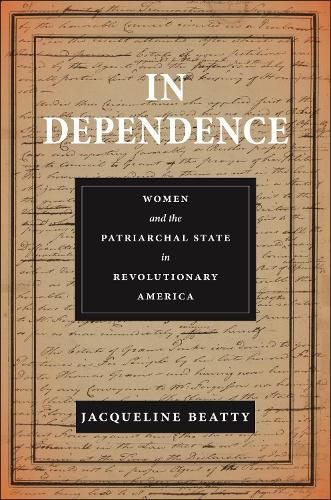Readings Newsletter
Become a Readings Member to make your shopping experience even easier.
Sign in or sign up for free!
You’re not far away from qualifying for FREE standard shipping within Australia
You’ve qualified for FREE standard shipping within Australia
The cart is loading…






Examines the role of the American Revolution in the everyday lives of women
Patriarchal forces of law, finance, and social custom restricted women's rights and agency in revolutionary America. Yet women in this period exploited these confines, transforming constraints into vehicles of female empowerment. Through a close reading of thousands of legislative, judicial, and institutional pleas across seventy years of history in three urban centers, Jacqueline Beatty illustrates the ways in which women in the revolutionary era asserted their status as dependents, demanding the protections owed to them as the assumed subordinates of men. In so doing, they claimed various forms of aid and assistance, won divorce suits, and defended themselves and their female friends in the face of patriarchal assumptions about their powerlessness. Ultimately, women in the revolutionary era were able to advocate for themselves and express a relative degree of power not in spite of their dependent status, but because of it.
Their varying degrees of success in using these methods, however, was contingent on their race, class, and socio-economic status, and the degree to which their language and behavior conformed to assumptions of Anglo-American femininity. In Dependence thus exposes the central paradoxes inherent in American women's social, legal, and economic positions of dependence in the Revolutionary era, complicating binary understandings of power and weakness, of agency and impotence, and of independence and dependence. Significantly, the American Revolution provided some women with the language and opportunities in which to claim old rights-the rights of dependents-in new ways. Most importantly, In Dependence shows how women's coming to consciousness as rights-bearing individuals laid the groundwork for the activism and collective petitioning efforts of later generations of American feminists.
$9.00 standard shipping within Australia
FREE standard shipping within Australia for orders over $100.00
Express & International shipping calculated at checkout
Examines the role of the American Revolution in the everyday lives of women
Patriarchal forces of law, finance, and social custom restricted women's rights and agency in revolutionary America. Yet women in this period exploited these confines, transforming constraints into vehicles of female empowerment. Through a close reading of thousands of legislative, judicial, and institutional pleas across seventy years of history in three urban centers, Jacqueline Beatty illustrates the ways in which women in the revolutionary era asserted their status as dependents, demanding the protections owed to them as the assumed subordinates of men. In so doing, they claimed various forms of aid and assistance, won divorce suits, and defended themselves and their female friends in the face of patriarchal assumptions about their powerlessness. Ultimately, women in the revolutionary era were able to advocate for themselves and express a relative degree of power not in spite of their dependent status, but because of it.
Their varying degrees of success in using these methods, however, was contingent on their race, class, and socio-economic status, and the degree to which their language and behavior conformed to assumptions of Anglo-American femininity. In Dependence thus exposes the central paradoxes inherent in American women's social, legal, and economic positions of dependence in the Revolutionary era, complicating binary understandings of power and weakness, of agency and impotence, and of independence and dependence. Significantly, the American Revolution provided some women with the language and opportunities in which to claim old rights-the rights of dependents-in new ways. Most importantly, In Dependence shows how women's coming to consciousness as rights-bearing individuals laid the groundwork for the activism and collective petitioning efforts of later generations of American feminists.